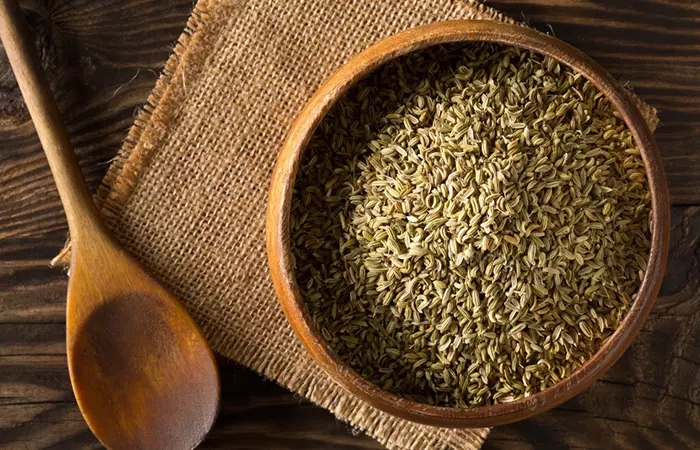15 Fast-Acting Home Remedies For Vomiting During Pregnancy
Relieve your ever-present nausea with these refreshing and simple natural solutions.

Image: Shutterstock
Vomiting during pregnancy, also known as morning sickness, is common, annoying, and uncomfortable.

Unlike its name, pregnant women experience it all day long. The symptoms develop during the sixth week of pregnancy and go away by the fourteenth week of pregnancy. However, some women experience it throughout their pregnancy and may experience severe dehydration and fatigue. In this article, we look at some of the home remedies you can try to allocate the symptoms of vomiting during pregnancy.
In This Article
What Causes Vomiting During Pregnancy?
The exact cause of vomiting during pregnancy is yet to be established. But it is believed that a combination of physical changes that a woman’s body undergoes when she is pregnant is what may cause it. The possible causes of vomiting during pregnancy include:
- Increase in Human Chorionic Gonadotrophini During pregnancy, the placenta makes this hormone to thicken the uterine lining of the mother to protect the embryo. (HCG)
- A rise in estrogen levels
- Enhanced sense of odor
- A sensitive stomach
- Stress
- If you are pregnant with twins, you might be more prone to vomiting.
- Symptoms of vomiting and nausea in a previous pregnancy.
- If you are prone to motion sickness, there is a higher chance that you will experience nausea and vomiting during pregnancy.
- A family history of nausea during pregnancy
- A history of migraine headaches
Let’s now look at the symptoms.
Key Takeaways
- Ginger can soothe the stomach and reduce nausea.
- Acupressure: A massage or pressing on particular wrist points helps lessen morning sickness and vomiting during pregnancy.
- Aromatherapy: Research indicates that some essential oils, such as peppermint, lemon, and ginger, can help reduce nausea.
- Hydration: Keeping the body well-hydrated during pregnancy helps reduce nausea and vomiting.
- Crackers: Before getting out of bed in the morning, munching on a few saltine crackers help reduce nausea.
- The citrusy smell of lemon can help reduce pregnancy-related nausea.
- To help alleviate feelings of nausea, have smaller but more frequent meals throughout the day.
What Are The Symptoms Of Morning Sickness During Pregnancy?
While some experience nausea and vomiting only in the morning, a majority of pregnant women experience nausea intermittently, all day long
. The common symptoms are as follows:
- Increased saliva production, sensitivity to odors, and change in taste.
- Hyperemesis gravidarum: This is a medical condition when nausea and vomiting result in about 5% or more weight loss in an expecting woman. This might be a result of dehydration and requires hospitalization. It is much worse than normal nausea and morning sickness.
Listed below are some amazing home remedies that can offer quick relief and help treat nausea and morning sickness over time.
How To Stop Vomiting During Pregnancy Naturally
- Orange Juice
- Water
- Ginger
- Vitamin B6
- Peppermint
- Cinnamon
- Lemon
- Fennel
- Wheat Germ
- Apple Cider Vinegar
- Yogurt
- Kiwi
- Cloves
- Vegetable Soup
- Almonds
Home Remedies To Stop Vomiting During Pregnancy
Note:Though most of these remedies are backed by science and pregnancy-friendly, make sure to consult your doctor before using any of these ingredients.
1. Oranges

The fresh and citric odor of oranges can help relieve nausea almost as soon as it comes in contact with your nostrils.
You Will Need
- 1 cup of freshly squeezed orange juice
- 1 teaspoon of powdered orange peel
What You Have To Do
1. Take a teaspoon of powdered orange peel and suck on it.
2. After a while, drink a cup of orange juice.
How Often You Should Do This
Do this whenever you feel nauseous or uneasy.
2. Water
You must up your intake of water if you are on a vomiting spree during pregnancy. Try sipping on a little water to check if your stomach can tolerate it.
You must remember to drink at least 8 glasses of water every day to prevent dehydration (1). You can also suck on some ice chips to help with nausea and vomiting.
3. Ginger
Ginger is a proven remedy for vomiting and nausea. The fresh aroma of ginger can help with nausea, while its antispasmodici A type of medication for pregnant women to relieve them of abdominal pain, cramps and irritable bowel syndrome. effects relax your intestinal muscles. Multiple studies are in favor of consuming ginger to help with nausea during pregnancy (2), (3).
You Will Need
- 1-2 inches of ginger
- 1 cup of hot water
- Honey
What You Have To Do
- Steep ginger in a cup of steaming hot water for 10 minutes.
- Strain and let it cool a bit before adding some honey to it.
- Sip on the warm ginger tea slowly.
How Often You Should Do This
You can drink ginger tea 2-3 times daily.
Alicia Darleen, a blogger, shares her personal experience of dealing with morning sickness: “I remember finding out I was pregnant, and it was all fun and exciting until I couldn’t hold anything down (i).” She adds, “Ginger was a life saver for me personally. I loved the ginger drinks (make sure they contain real ginger), ginger candy, and ginger slices (yes, the ones you get on the side of sushi). Once I started feeling nauseated, I would pop a ginger candy in my mouth, and I would immediately feel better.”
4. Vitamin B6
Intake of foods rich in vitamin B6 may have a positive effect on morning sickness and constant nausea
(4).
Legumes, nuts, soy, poultry, and fish contain sufficient amounts of vitamin B6. Doctors may also recommend supplements for vitamin B6 (10-25 mg) that are to be taken thrice daily. However, consult your healthcare provider for the right dosage of supplements for you.
Note: Do not self-medicate. Consult your doctor for the right dosage of supplements.
5. Peppermint

Peppermint contains menthol that gives it a distinct odor and flavor. The minty taste and smell help in easing nausea and vomiting (5).
You Will Need
- A handful of peppermint leaves
- 1 cup of hot water
- Honey
What You Have To Do
- Steep the peppermint leaves in hot water for 10 minutes.
- Strain and allow it to cool a bit.
- Add some honey and sip on the mint tea to combat nausea during pregnancy.
- Alternatively, you can also just sniff or chew on these leaves.
How Often You Should Do This
Do this at least 2 times daily.
6. Cinnamon
Cinnamon is a widely used spice for cooking. It has antiemetic properties that can help relieve nausea and vomiting (6).
You Will Need
- 1 inch of cinnamon stick
- 1 cup of hot water
- Honey
- Cinnamon gums (optional)
What You Have To Do
- Steep the cinnamon stick in a cup of hot water for about 10 minutes.
- Allow it to cool a bit and add some honey to it.
- Drink the cinnamon tea.
- You can also chew on some cinnamon gums for relief from nausea and vomiting.
How Often You Should Do This
Drink cinnamon tea at least 2 times daily.
7. Lemon
The citrusy flavor and aroma of lemons provide immediate relief from nausea and vomiting among pregnant women (7), (8). Additionally, lemons are rich sources of various minerals that are helpful in improving your overall health.
You Will Need
- 1/2 lemon
- 1 glass of water
- Honey
What You Have To Do
- Squeeze the juice from half a lemon and mix it in a glass of water.
- Add a little honey and consume the lemon juice.
- You can also suck on the lemon while inhaling its aroma deeply.
How Often You Should Do This
Do this immediately when you feel nauseated.
8. Fennel

Fennel seeds have a wonderful aroma and flavor and antiemetic properties (9). Thus, they can provide quick relief from nausea and vomiting during pregnancy.
You Will Need
- 1 teaspoon of fennel seeds
- 1 cup of hot water
- Honey
What You Have To Do
- Add a teaspoon of fennel seeds to a cup of hot water.
- Allow it to steep for 5 to 10 minutes.
- Strain and consume the fennel tea.
- You can also add some honey to the tea after it cools down a bit.
- Alternatively, you can chew on some fennel seeds.
How Often You Should Do This
Drink this tea 2-3 times daily.
9. Wheat Germ
Wheat germ is a rich source of vitamin B6, which is known to help with nausea and vomiting in pregnant women (4).
You Will Need
- 2-3 teaspoons of wheat germ
- 1 cup of warm milk
- Honey
What You Have To Do
- Add wheat germ to a cup of warm milk.
- Stir well until it is dissolved.
- Add honey to taste.
- Consume this mixture.
How Often You Should Do This
You can consume this mixture multiple times daily.
10. Apple Cider Vinegar
Apple cider vinegar is an alkaline-forming vinegar. This activity of ACV is highly beneficial in maintaining the pH of your body and neutralizing the acid content in your stomach, thus treating nausea and morning sickness. However, there are no scientific studies to prove the efficacy of ACV for morning sickness.
You Will Need
- 1 tablespoon of apple cider vinegar
- 1 glass of cold water
- Honey
What You Have To Do
- Mix a tablespoon of apple cider vinegar with a glass of cold water.
- Add a little honey to this mixture and consume it.
How Often You Should Do This
Drink this mixture once every night.
11. Yogurt

Yogurt is a rich source of probiotics. Probiotics are good bacteria that aid digestion, which can, in turn, help reduce the symptoms of vomiting during pregnancy (10).
You Will Need
A bowl of plain yogurt
What You Have To Do
Consume a bowl of plain yogurt.
How Often You Should Do This
Do this 1-2 times daily.
12. Kiwi
Kiwis are rich in folate, which is an important nutrient during pregnancy (11).
You Will Need
- 1-2 cut kiwis
- 1 banana (optional)
- 1 cup of water
- Honey (optional)
What You Have To Do
- Blend the kiwi pieces and banana with water.
- Add honey and drink the refreshing juice.
- You can also blend kiwis alone or eat them.
How Often You Should Do This
Do this whenever you feel nauseous.
13. Cloves
Cloves have been used in folk medicine to relieve morning sickness. They contain a compound called eugenol that imparts a strong aroma and flavor to them (12). This helps in treating vomiting and nausea. It also has a soothing effect on your stomach.
You Will Need
- 2-3 cloves
- 1 cup of hot water
- Honey (optional)
What You Have To Do
- Steep the cloves in a cup of hot water for 10 minutes.
- Strain and allow it to cool a little. Add some honey.
- Drink the clove tea.
How Often You Should Do This
You can drink clove tea 2 times daily.
14. Vegetable Soup
Since vomiting tends to leave you dehydrated, it is recommended that you increase your fluid intake post vomiting during pregnancy. Once you know that your stomach can tolerate water, you can start consuming broths and soups made of vegetables or chicken. These are clear liquids that will not only provide you with the much-needed calories but also prepare your stomach for solid foods.
15. Almonds

Almonds are rich sources of various nutrients. The high protein content of almonds is believed to relieve morning sickness. They also help in digestion, which, in turn, can help reduce nausea and treat morning sickness (13).
You Will Need
10-12 soaked almonds
What You Have To Do
Consume some soaked almonds every night to combat morning sickness and vomiting during pregnancy naturally.
You can also snack on small amounts of almonds throughout the day.
How Often You Should Do This
Once every night before going to bed.
 Quick Tip
Quick TipApart from the home remedies mentioned above, there are several other herbs that may help with pregnancy nausea. Check out the next section to know more.
Herbs For Pregnancy Nausea
- Raspberry herb may help alleviate morning nausea and prevent miscarriage and overdue pregnancy. However, its consumption may cause hypoglycemic episodes in women with gestational diabetes (14). Hence, consult a doctor before using this herb.
- A study suggests that cardamom aromatherapy may be effective in reducing vomiting and nausea episodes in mothers (15).
- Anecdotal evidence suggests that slippery elm may ease vomiting during pregnancy and soothe an upset stomach.
Other herbs such as spearmint, lavender, and lemon balm may help relieve pregnancy nausea. However, scientific studies are needed to prove their effectiveness in managing pregnancy nausea.
Since consistent vomitings can cause severe dehydration, it is important to replenish your body with nutrients by consuming certain nutrient and vitamin-rich foods and fluids.
What To Eat After Vomiting During Pregnancy
These tips will help you get back to your normal diet once your appetite returns.
1. Increase Your Fluid Intake
Drink 6-8 glasses of water every day. You can also include herbal teas like chamomile in your diet. For quick relief, mix apple cider vinegar and honey in water and drink it. This can help relieve the queasy sensation you may experience after vomiting.
2. Consume Protein-Rich Foods
Studies show that consuming protein-rich foods can suppress nausea (16). It can also help impart energy to your body.
3. Eat Soda Crackers Or Bars
Experiencing gas during pregnancy is very common. To tackle this problem you can consume certain foods like crackers that are rich in starch and thus help in absorbing gastric acid and settle the uneasiness in your stomach. Carry some crackers in your bag, and snack on them whenever you feel nauseous (17).
4. Have Anything Made Of Ginger
The bioactive components can help reduce the symptoms associated with nausea. It can be consumed as a tea, or dried ginger candies, or ginger biscuits, etc.
 Quick Tip
Quick TipWe hope this answers your question about what to eat when nauseous. You can always try these home remedies to manage symptoms associated with morning sickness. However, as you already know, prevention is always better than cure. Listed below are a few tips to help you deal with vomiting during pregnancy.
Preventive Tips
- Have small meals or snacks at regular intervals.
- Don’t lie down immediately after eating.
- Do not get up immediately on waking up. Sit for a few minutes and relax before getting out of the bed.
- Avoid foods that make you nauseous.
- Consume foods that are served at a cold or normal temperature. This is because hot foods have a stronger aroma and might induce vomiting.
- You may also practice some relaxation techniques like yoga or meditation.
- Steer clear of spicy, fried, and fatty foods as they irritate your digestive system and are hard to digest.
- Sip on fluids throughout the day to stay hydrated.
- Get some fresh air by taking a walk or opening the window.
- Get ample amounts of rest and take small naps at regular intervals.
- Try wearing an acupressure band on your wrist. Although this band is designed to help those who become seasick easily, it is also used by pregnant women to avoid vomiting and morning sickness (18).
Although home remedies can be effective to quite an extent, extensive or too frequent vomiting may be concerning. You must seek professional medical advice in those cases. Let’s learn more about what warrants a visit to the doctor in the section below.
When To Seek Help
It is important to seek medical attention if you experience the following in addition to excessive vomiting:
- Severe dehydration
- Excessive thirst
- Dizziness
- Dark urine
- Decreased urination.
- Persistent vomiting
- Intense pain or discomfort
- Difficulty breathing
Infographic: Morning Sickness Vs. Hyperemesis Gravidarum
While nausea and vomiting are commonly expected and normal during pregnancy, sometimes it can present as a serious condition called hyperemesis gravidarumi When this hormone increases in the blood level, a pregnant woman faces extreme morning sickness and nausea. , which can complicate the pregnancy and require prompt medical attention. Check out the infographic for a comparison between morning sickness and this medical condition that also involves nausea and vomiting.
Some thing wrong with infographic shortcode. please verify shortcode syntax
Contrary to what the term ‘morning sickness’ suggests, nausea and vomiting during pregnancy may strike at any point in the day. The exact causes of morning sickness are not clear, but it is thought that factors like the increase in HCG and estrogen levels, history of motion sickness, twin pregnancy, stress, and increased sensitivity may contribute to it. Orange juice, vitamin B6, apple cider vinegar, lemon, fennel, ginger, cinnamon, wheat germ, and cloves are some kitchen staples that may help combat morning sickness and relieve vomiting. If you notice weight loss and severe nausea and vomiting, contact your OBGYN immediately, as it can be indicative of an emergency condition called Hyperemesis gravidarum.
Frequently Asked Questions
Do you experience more morning sickness if you are pregnant with a boy or a girl?
There is conflicting information in this regard. While one study stated that women who gave birth to girls experience more morning sickness, another study found that the rate of morning sickness was higher in women with male fetuses (19), (20).
Why am I not vomiting during my pregnancy?
A: Women who experience travel sickness or are easily turned off by certain odors are more prone to morning sickness during pregnancy. Hence, if you have had no such past experiences, the chances are that you may not vomit or feel nauseous during your pregnancy, and this is completely normal.
What types of food can I eat after vomiting during pregnancy?
If you experience morning sickness often, chew on some crackers or toast before getting out of your bed. You can also follow the BRAT diet that contains bananas, rice, applesauce, and toast. Also, sip on water, fresh juices, and soups throughout the day.
When does vomiting start during pregnancy?
A: The feeling of nausea usually begins during the 6th week of pregnancy, but it may also begin when you are just 4 weeks pregnant. The symptoms of vomiting usually disappear by the 14th week of pregnancy for most women. But for a certain lot, vomiting and morning sickness may keep showing up every now and then throughout their pregnancy.
What does pregnancy fatigue feel like?
A lack of energy and constant exhaustion may cause pregnancy fatigue.
Is nausea a good symptom of pregnancy?
Nausea is a common pregnancy symptom and not something you should be worried about. However, if you tend to feel nauseous all the time you might want to consult your doctor.
How long does nausea last in pregnancy?
Nausea or morning sickness in pregnancy usually begins from 8-9 weeks and can last up to 12 weeks.
Can vomiting hurt the baby?
No, vomiting can be uncomfortable for the mother, but it doesn’t hurt the baby.
Does sleep help with morning sickness?
Research shows having quality sleep and a proper sleep cycle can be beneficial during pregnancy and aid in improving overall condition and mood (21).
Can coconut water cause vomiting during pregnancy?
On the contrary, the electrolytes present in coconut water can stabilize the body and compensate for the loss of water during vomiting (22).
References
Articles on StyleCraze are backed by verified information from peer-reviewed and academic research papers, reputed organizations, research institutions, and medical associations to ensure accuracy and relevance. Read our editorial policy to learn more.
- Nutrition Column An Update on Water Needs during Pregnancy and Beyond, The Journal of Perinatal Education, US National Library of Medicine, National Institutes of Health.
https://www.ncbi.nlm.nih.gov/pmc/articles/PMC1595116/ - Ginger for nausea and vomiting in pregnancy: randomized, double-masked, placebo-controlled trial, Obstetrics and Gynecology, US National Library of Medicine, National Institutes of Health.
https://pubmed.ncbi.nlm.nih.gov/19445102/ - The Effectiveness of Ginger in the Prevention of Nausea and Vomiting during Pregnancy and Chemotherapy, Integrative Medicine Insights, US National Library of Medicine, National Institutes of Health.
https://www.ncbi.nlm.nih.gov/pmc/articles/PMC4818021/ - Vitamin B6 is effective therapy for nausea and vomiting of pregnancy: a randomized, double-blind placebo-controlled study, Obstetrics and Gynecology, US National Library of Medicine, National Institutes of Health.
https://pubmed.ncbi.nlm.nih.gov/2047064/ - Effect of mint aroma on nausea, vomiting and anxiety in pregnant women,Journal of Family Medicine and Primary Care.
https://journals.lww.com/jfmpc/pages/default.aspx - Antibacterial Effects of Cinnamon: From Farm to Food, Cosmetic and Pharmaceutical Industries, Nutrients, US National Library of Medicine, National Institutes of Health.
https://www.ncbi.nlm.nih.gov/pmc/articles/PMC4586554/ - The Effect of Lemon Inhalation Aromatherapy on Nausea and Vomiting of Pregnancy: A Double-Blinded, Randomized, Controlled Clinical Trial, Iranian Red Crescent Medical Journal, US National Library of Medicine, National Institutes of Health.
https://www.ncbi.nlm.nih.gov/pmc/articles/PMC4005434/ - Nausea and Vomiting Remedies in Iranian Traditional Medicine (ITM), Iranian Journal of Public Health, US National Library of Medicine, National Institutes of Health.
https://www.ncbi.nlm.nih.gov/pmc/articles/PMC4645744/ - Foeniculum vulgare Mill: A Review of Its Botany, Phytochemistry, Pharmacology, Contemporary Application, and Toxicology, BioMed Research International, US National Library of Medicine, National Institutes of Health.
https://www.ncbi.nlm.nih.gov/pmc/articles/PMC4137549/ - Health Benefits of Probiotics: A Review, International Scholarly Research Network, US National Library of Medicine, National Institutes of Health.
https://www.ncbi.nlm.nih.gov/pmc/articles/PMC4045285/ - The nutritional and health attributes of kiwifruit: a review, European Journal of Nutrition, US National Library of Medicine, National Institutes of Health
https://www.ncbi.nlm.nih.gov/pmc/articles/PMC6267416/ - Clove (Syzygium aromaticum): a precious spice, Asian Pacific Journal of Tropical Biomedicine, US National Library of Medicine, National Institutes of Health.
https://www.ncbi.nlm.nih.gov/pmc/articles/PMC3819475/ - Effects of almond and pistachio consumption on gut microbiota composition in a randomised cross-over human feeding study, The British Journal of Nutrition, US National Library of Medicine, National Institutes of Health.
https://pubmed.ncbi.nlm.nih.gov/24642201/ - Raspberry leaves and extracts-molecular mechanism of action and its effectiveness on human cervical ripening and the induction of labor Nutrients Journal US National Library of Medicine National Institutes of Health.
https://www.ncbi.nlm.nih.gov/pmc/articles/PMC10383074/ - Effect of cardamom inhalation therapy on intra-and postoperative nausea and vomiting of mothers undergoing spinal anesthesia for elective cesarean section Journal of PeriAnesthesia Nursing US National Library of Medicine National Institutes of Health.
https://pubmed.ncbi.nlm.nih.gov/35581106/ - Protein meals reduce nausea and gastric slow wave dysrhythmic activity in first trimester pregnancy The American Journal of Physiology US National Library of Medicine National Institutes of Health.
https://pubmed.ncbi.nlm.nih.gov/10516152/ - A survey on the management of nausea and vomiting in pregnancy by obstetrician/gynecologists Primary Care Update for Ob/Gyns US National Library of Medicine National Institutes of Health.
https://pubmed.ncbi.nlm.nih.gov/11246031/ - P6 acupressure reduces morning sickness Journal of the Royal Society of Medicine US National Library of Medicine National Institutes of Health.
https://www.ncbi.nlm.nih.gov/pmc/articles/PMC1291716/ - Sickness in Pregnancy and Sex of Child Lancet US National Library of Medicine National Institutes of Health.
https://pubmed.ncbi.nlm.nih.gov/10636378/ - Relationship Between Fetal Sex and Nausea and Vomiting During Pregnancy World Applied Sciences Journal ResearchGate.
https://www.researchgate.net/publication/282652033_Relationship_Between_Fetal_Sex_and_Nausea_and_Vomiting_During_Pregnancy - Association Between Nausea and Vomiting During Pregnancy and Sleep Quality
https://www.ncbi.nlm.nih.gov/pmc/articles/PMC7802779/ - The Leading Concerns of American Women with Nausea and Vomiting of Pregnancy Calling Motherisk NVP Helpline
https://www.ncbi.nlm.nih.gov/pmc/articles/PMC3649700/
Read full bio of Dr. Jennifer Mercier
Read full bio of Shaheen Naser
Read full bio of Ravi Teja Tadimalla
Read full bio of Dipti Sharma



























Community Experiences
Join the conversation and become a part of our empowering community! Share your stories, experiences, and insights to connect with other beauty, lifestyle, and health enthusiasts.